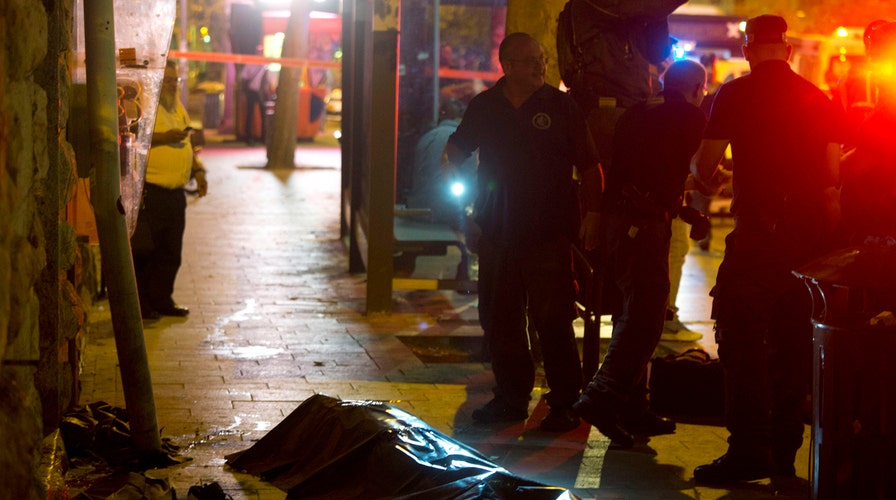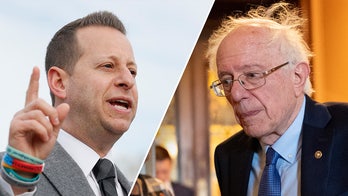The Obama administration is under pressure to help calm the growing violence in Israel which has some warning of a third intifada, as Israel's military steps up its response to deadly Palestinian attacks by deploying hundreds of troops.
Amid the unrest, Secretary of State John Kerry just announced plans to visit the region, and has spoken with Israeli Prime Minister Benjamin Netanyahu and Palestinian President Mahmoud Abbas.
"We're working on trying to calm things down," he said Tuesday during an event at Harvard University. "And I will go there soon at some point appropriately and try to work to re-engage and see if we can't move that away from this precipice."
White House Press Secretary Josh Earnest also cited that visit Wednesday when asked what President Obama is doing to address the crisis, saying Kerry will travel "in the near future." He said the visit underscores the "continuing deep concern" the U.S. has and urged both sides to take "affirmative steps" to calm tensions.
Yet the State Department under both Hillary Clinton and now Kerry so far has been unable to push forward the Israeli-Palestinian peace process. Relations between Obama and Netanyahu remain as chilly as ever -- particularly after the Iran nuclear deal put them on opposite sides of the debate -- and it's unclear how much sway the administration still has in the volatile region.
Retired Lt. Col. Ralph Peters, a Fox News analyst, cited Netanyahu's visit last month to Moscow to meet with Putin to discuss Syria. "He can see that Obama's Middle East non-policy has failed utterly," Peters said.
Kerry may be hoping his personal touch can help bring both sides together as tensions reach a critical point.
Tuesday was among the bloodiest days so far, as a pair of Palestinian stabbing and shooting attacks in Jerusalem killed three Israelis and another two attacks took place in the normally quiet Israeli city of Raanana. Three Palestinians, including two attackers, were also killed.
On Capitol Hill, U.S. lawmakers urged a stronger response from the administration.
"I stand behind Israel's fundamental right to defend itself and its people from violence and terror," Sen. Bob Menendez, D-N.J., said in a statement. "Palestinian President Mahmoud Abbas and his government have an obligation to stop these attacks, to cease the harsh rhetoric that incites them, and to negotiate in good faith for a peaceful resolution."
He added, "It is imperative that the United States continue to ensure that Israel has the resources [it] needs to enhance its security and meet these threats."
Sen. Mark Kirk, R-Ill., said "it is critical that the Obama administration and Congress press Palestinian Authority President Mahmoud Abbas ... to act decisively to end the growing wave of Palestinian violence and return to bilateral peace negotiations with Israel."
State Department spokesman John Kirby on Tuesday put out a statement condemning "in the strongest terms today's terrorist attacks against Israeli civilians."
He said the U.S. stresses the importance of "condemning violence and combating incitement" and is in "regular contact" with both governments. "We remain deeply concerned about escalating tensions and urge all sides to take affirmative steps to restore calm and prevent actions that would further escalate tensions," he said.
It's unclear what the U.S. message involves beyond those appeals.
Pressed repeatedly at Tuesday's briefing on what U.S. officials are doing and saying about the crisis, State Department spokesman Mark Toner said Kerry is urging both sides to condemn violence and combat incitement. But he would not elaborate beyond saying that the U.S. is delivering the same message to the Israelis and Palestinians. The only specific item he mentioned was that Kerry is stressing the "importance of upholding the status quo in word and in deed at Haram al-Sharif/Temple Mount."
This was in reference to what is seen as the spark for the fresh surge of violence -- rumors that Israel was plotting to take over Jerusalem's most sensitive holy site, sacred to both Muslims and Jews. Israel has adamantly denied the allegations.
Eight Israelis and 30 Palestinians -- including 13 identified by Israel as attackers -- have died in a month of unrest, with dozens of others wounded.
In response, Israeli police said 300 soldiers have been incorporated into their deployment on the streets of east Jerusalem, where many of the assailants are from.
Israeli Cabinet minister Yuval Steinitz said the current conflict had less to do with political differences and more with anti-Semitic incitement to create a religious war. He quoted Abbas' recent statement where he blessed "every drop of blood spilled for Allah" and said Jews desecrated a Jerusalem holy site with their "filthy feet."
Steinitz said, "It's all about horrible, anti-Jewish, racist incitement."
A column in National Review by attorney and writer David French said Israel is "on the brink of a third intifada," and questioned whether the Obama administration's waning influence in the region might fuel the unrest.
But Brookings Institution fellow Khaled Elgindy told Al Jazeera America it's "too early to say this is the 'third intifada' because we don't yet see an organized political leadership that can coordinate the various Palestinian pieces of this and can articulate political demands."
The first and second intifadas -- Palestinian uprisings against the Israeli occupation of the West Bank and Gaza Strip -- started in 1987 and 2000, respectively, and lasted several years.
The Associated Press contributed to this report.





